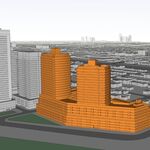Drove to Laval from Ottawa today (road trip with some friends), and decided to take Highway 50 for part of it. Of course, Highway 50 goes right past Mirabel, and it got me thinking. I figured this may be worth discussing here:
Would it be worth it to route the future Quebec City-Windsor HSR line, or more specifically the Ottawa-Montreal HSR line, through Mirabel and then down into Montreal? The land on the Ontario side of the river between Ottawa and the Quebec border is flat as can be, so I figured a new alignment than would then cross the Ottawa River just east of Hawkesbury, hit Mirabel, and then take the originally-conceived HSR alignment into downtown Montreal.
Even with the recent expansions to Trudeau, my understanding is that it's still under a bit of a capacity crunch. And given the prime real estate that it occupies, 10+ years down the road it may be worth re-evaluating whether or not keeping Mirabel shuttered (at least for passenger traffic), and keeping Trudeau open is really the best option. Heck, selling off the massive chunk of land that Trudeau sits on could probably fund a pretty decent percentage of the HSR project!
Of course, HSR on its own could cut down on the number of Montreal-Toronto and Montreal-Ottawa flights required, rendering the capacity crunch at Trudeau moot, seeing as how those 2 routes are amongst the busiest at the airport.




